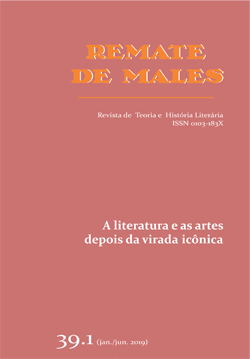Abstract
In discussing the origin, the meaning and the translation of the central notion in the research by Iuri Tynianov, namely, the oscillating traces, the article seeks to insist on the relation between the definition of poetry and the image of reversibility. Bringing echoes of German romanticism and trying to draw up the paradoxes of its own time, Tynianov’s theory indeed demonstrated a great concern with the vocabulary used to describe the dynamic form of the literary text and its dynamic inscription into the fields of knowledge. Enthusiast of experiment and of the contradiction’s creative potential, Tynianov hesitated between organic metaphors inherited from the romanticism and the spatial ones inspired by the literature of the beginning of the XX century as well as by the pós-Cézannean painting. Struggling for the enhancement of the discourse of the literary theory, Tynianov’s investigations found developments in researches by Julia Kristeva, among others who insisted on the subversion of the space vision in terms of a neutral recipient or a medium of separation, looking for its comprehension in relation to text with its anguishing unfoldings provoked by the experience of loss.
References
AGAMBEN, Giorgio. Nudez. Trad. D. Pessoa. Belo Horizonte: Autêntica, 2014.
BACHELARD, Gaston. A água e os sonhos. Ensaio sobre a imaginação da matéria. Trad. A. de Pádua Danesi. São Paulo: Martins Fontes, 2013.
BENJAMIN, Walter. Obras escolhidas I. Trad. S. P. Rouanet. Rio de Janeiro: Ed. Brasiliense, 1985.
CHKLOVSKI, Viktor. Arte como procedimento. In: OLIVEIRA TOLEDO, Dionísio de. (Org.). Teoria da literatura. Formalistas russos. Trad. A. M. Ribeiro et al. Porto Alegre: Editora Globo, 1971.
CONLEY, Tom. A writing of space: on french critical theory in 1973 and its aftermath. Diacritics, 33, 2003, pp. 188-203.
CZAYKOWSKI, Bogdan. The idea of reality in the poetry of Czesław Miłosz. In: Between Anxiety and Hope. The poetry and writing of Czesław Miłosz. Alberta: The University of Alberta Press, 1988, pp. 88-111.
FRANK, Joseph. La forme spaciale dans la littérature moderne. Poétique, v. 10. Paris: Seuil, 1972, pp. 244-266.
ГУДКОВ, Л. Д. Понятие и метафоры истории у Тынянова и Опоязовцев. In: Тыняновский сьборник. III Тыняновские чтения. Riga: Zinatne, 1986, pp. 91-108.
HAROCHE, Claudine. Da palavra ao gesto. Trad. A. Montoia e J. Seixas. Campinas: Papirus, 1998.
HARWIG, Julia. Zawsze powroty. Z dzienników podróży. Varsóvia: Sic!, 2005.
KRISTEVA, Julia. La révolution du langage poétique. Paris: Seuil, 1974.
KRISTEVA, Julia. Polylogue. Paris: Seuil, 1977.
KRISTEVA, Julia. Pouvoirs de l’horreur. Essai sur l’abjection. Paris: Seuil, 1980.
НИКОЛЬСКАЯ, Т. Л. “Взгляды Тынянова на практику поэтыческого эксперимента”. In: Тыняновский сьборник. II Тыняновские чтения. Riga: Zinatne, 1986, pp. 1-77.
МАЛЕВИЧ, Казимир. От Сезанна до Супрематизма. [S.l.]: Narkompros, 1920.
MIŁOSZ, Czesław. Não mais. Trad. H. Siewierski e M. Paiva de Souza. Brasília: Editora UnB, 2003.
MIŁOSZ, Czesław. Wiersze wszystkie. Cracóvia: Znak, 2011.
MIŁOSZ, Czesław. Ogród nauk. Cracóvia: Znak, 2013.
NOVALIS, F. von H. Pólen. Fragmentos. Diálogos. Monólogo. Trad. R. Rodrigues Torres Filho. São Paulo: Iluminuras, 1988.
PIGNATARI, Décio. (Org. e trad.). Marina Tsvetáieva. Curitiba: Travessa dos Tradutores, 2005.
RIFFATERRE, Michel. Le poème comme représentation. In: Poétique, n. 4, 1970, pp. 401-418.
RILKE, Rainer. M. Auguste Rodin. Leipzig: Insel Verlag, 1984.
SCHNAIDERMAN, Boris. Prefácio. In: TOLEDO, Dionísio de Oliveira (Org.). Teoria da literatura. Formalistas russos. Trad. A. M. Ribeiro et al. Porto Alegre: Editora Globo, 1971, pp. IX-XXII.
SICA, Giorgio. O vazio e a beleza. De Van Gogh a Rilke: como o Ocidente encontrou o Japão. Campinas: Unicamp, 2017.
SIEWIERSKI, H.; SOUZA, M. Paiva de Introdução. Introdução. In: MIŁOSZ, Czesław. Não mais. Trad. H. Siewierski e M. Paiva de Souza. Brasília: Editora UnB, 2003, pp. 9-31.
TSVETÁIEVA, Marina. Indícios flutuantes. Trad. A. F. Bernardini. São Paulo: Martins pontes, 2006.
TYNIANOV, Iuri. O problema da linguagem poética II. O sentido da palavra poética. Trad. M. J. Azevedo Pereira e C. Barone. Rio de Janeiro: Tempo Brasileiro, 1975.
TYNIANOV, Iuri. O ritmo como fator construtivo do verso. In: COSTA LIMA, Luiz. Teoria da literatura em suas fontes. Vol. 2. Trad. L. Lobo. Rio de Janeiro: Civilização Brasileira, 2002, pp. 473-486.
ТЫНЯНОВ, Юрий. Проблема стихотворного языка. Статьи. Moscou: Sovetski Pisatel, 1965.
ТЫНЯНОВ, Юрий. Литернатурная эволюция. Избранные труды. Moscou: Agraf, 2002.

O periódico Remate de Males utiliza a licença do Creative Commons (CC), preservando assim, a integridade dos artigos em ambiente de acesso aberto.


